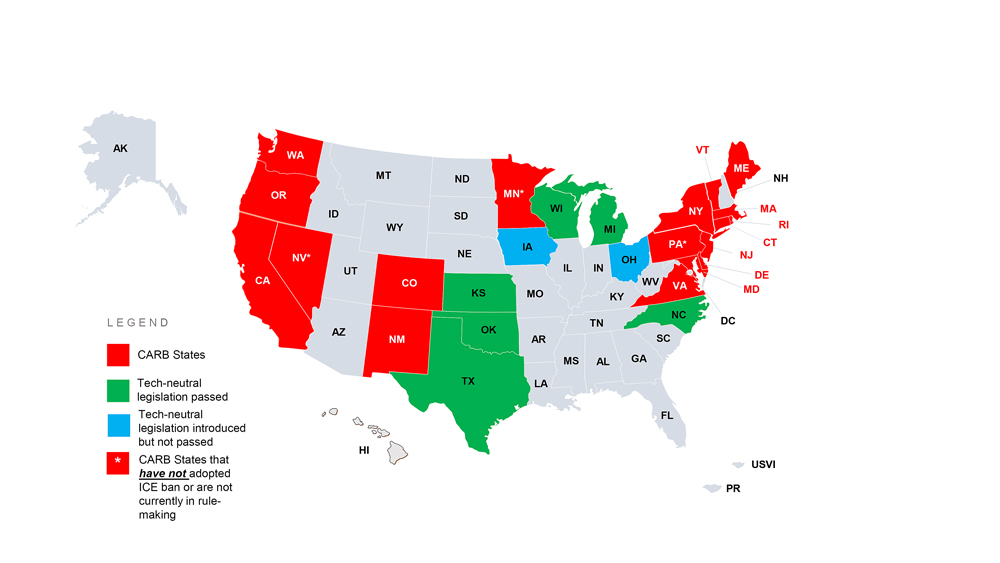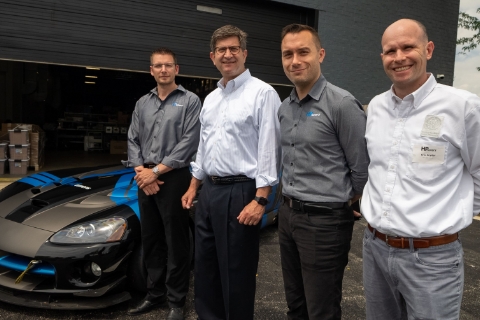SEMA Successfully Mobilizes the Automotive SPECIALTY-EQUIPMENT Industry’s First-Ever SuperPAC
BY KAREN BAILEY-CHAPMAN
SEMA launched its first-ever SuperPAC this past fall to support legislative candidates who would back the repeal of Virginia’s internal-combustion engine (ICE) ban. Debuting as Driving Force Action (DFA), the SuperPAC focused its efforts on helping Governor Glenn Youngkin of Virginia to secure a needed majority in the November elections to accomplish one of his campaign priorities—repealing the ICE ban. While the Governor’s party fell short of capturing the necessary number of seats to get that majority, DFA succeeded in three of the four senate races where it engaged in direct candidate advocacy.
Why Virginia? While most of America chooses its state lawmakers and governors in the same year that they elect their federal lawmakers (even-
numbered years), there are a handful of states that elect their lawmakers in odd-numbered years, and Virginia is among them. Plus, because of the state’s redistricting schedule, every member of the legislature was up for election or re-election because they all had to run in newly drawn districts—a once-in-a-10-year opportunity when voters can vote on everyone in the same cycle (except the governor).
In addition, Virginia is one of the “CARB states.” There are 17 California Air Resources Board [CARB] states that have attached themselves to California’s emissions standards, including in all but three,
California’s impending ban on ICEs. Virginia became a CARB state in 2021 under the previous governor, yet many Virginians did not know this. An attempt to repeal Virginia’s ICE ban in the legislature in early 2023 was stymied by the Democrat-held Senate.
The November election presented the next opportunity to reverse this bad policy in the Commonwealth.
Moving the Needle
Internal polling conducted by SEMA in Virginia in late 2022 showed high unawareness of Virginia’s attachment to California’s emissions laws and regulations. Eighty-one percent of Virginia’s voters had heard little or nothing at all about the ban on ICEs. The same poll showed that once voters learned of the ban, 62% opposed it.
DFA launched its independent campaign just before Labor Day, allowing an eight-week window to educate and mobilize voters on the issue of ICE bans and the state’s EV mandate. Ultimately, the education campaign significantly elevated the issue of the EV mandate ahead of election day. A tremendous groundswell of opposition to this policy—from both thought leaders and the public—showcased how much Virginians (and Americans) want the freedom to choose what they drive.
Two weeks before election day, campaign polling in the four target senate districts where DFA was engaged, found only 16% of Republicans and 12% of Independent voters were unaware of the state’s ICE ban. Unawareness of the issue among Democrat voters was in the low 20s—a significant shift of 60 points or more across all voter groups compared to the statewide poll conducted nine months earlier. The majority of Republicans and Independents in this late poll said they would support the candidate who would repeal the ICE ban.
Post-election analysis of DFA’s digital campaign analytics showed that the campaign reached and engaged more equitably across all age demographics, something rarely seen in today’s policy environment. The campaign garnered more then 13.5 million impressions across four major social networks in just eight weeks.
Key Takeaways
The DFA campaign mobilized constituencies of all types and emphasized the need for our nation’s leaders to reverse track on government mandates that remove your right to decide what kind of car you drive.
One key race that was clearly influenced in this cycle was District 24, where candidate Sheriff Danny Diggs overtook the incumbent
Senator Monty Mason, a staunch supporter of the ICE ban policy and the deciding vote to block the repeal of Virginia’s ICE ban law. Other notable shifts were in District 17, where Emily Brewer defeated Clinton Jenkins, and District 27, where Tara Durant upset Joel Griffin; the candidates who won committed to repealing the EV mandate. The DFA campaign was heavily active in educating voters about the EV mandate in these districts and which candidate was on the right side of the issue. Of note, two of these districts were considered toss-up or lean-Democrat districts: District 17 (Brewer) favored Democrats by three points, and District 24 (Diggs) showed no party advantage in the electorate going into the election season.
Political pundits often refer to Virginia as a bell-wether state. This suggests that Virginia’s odd-year elections provide learnings for federal and other statewide campaigns preparing for the upcoming 2024 election cycle. Virginia’s electorate is also considered a reasonable sampling of, and mimics, the national electorate with the contrasts between voters in the wealthier north (suburban Washington, D.C.) to the rural south and energy-industry-dependent west and the urban centers of the center and east, including a significant military and retired military population. The EV mandate (or ICE ban) was lauded by some media in the run-up to election day as an issue that Republican candidates could run a positive campaign around, compared to the social issues that dominated the campaign otherwise.
There is an essential lesson for the Biden administration and the Environmental Protection Agency (EPA) as they consider a similar federal ICE ban. Clearly, segments of the country are not in favor of a mandate that phases out gas-powered cars.
Our plan is to continue to keep pressure on our elected members on both sides of the aisle and urge them to reevaluate California’s gas car ban in various states and nationally. SEMA sees the federal EV mandates and the creep of California’s laws into other states as a potential topline election issue for the 2024 campaign cycle. For anyone who has watched the Republican presidential candidate debates this cycle, it’s hard to get through the first five minutes without the hopefuls laying their stake in the ground against the vehicle mandates.

Why a SuperPAC?
This is a common question. SEMA already has a federal PAC (called the SEMA and PRI PAC), so why does the association now need a SuperPAC?
The federal PAC is a critically important part of the SEMA Government Affairs team advocacy work. Because SEMA itself cannot donate dollars directly to candidate campaigns, our money is considered corporate dollars, SEMA solicits personal donations from members to fund the traditional federal
PAC that can donate directly to candidate campaigns. The work on building this part of SEMA’s political muscle will continue and work parallel to the SuperPAC.
However, donations to the PAC from an individual and to candidates running for election are capped at $5,000 under federal law. Political enthusiasts know that for campaigns, especially in congressional districts and statewide races like U.S. Senate races, $5,000 is a small amount compared to the millions it takes to run a campaign for Congress. That’s where a SuperPAC comes in.
Under federal and most state laws, SuperPACs can accept corporate dollar donations, and there is no limit on how much can be donated. There are some other rules that SuperPACs must adhere to, such as donor names are disclosed on campaign finance reports and the SuperPAC can’t coordinate with candidate campaigns. You’ll often hear them reported as “independent expenditures” in the media. By creating DFA, SEMA can now directly advocate for or against candidates based on how they stand on our issues. We can utilize corporate dollars to say “vote for” or “vote against” candidates based on the issues important to our industry, and this is a potent tool.
As a result of this year’s efforts, car enthusiasts emerged from this election stronger, more united and more determined than ever to protect our rights. SEMA and DFA hope that those elected will take notice of this issue and recognize the desire of Virginia consumers to have their freedom of vehicle choice protected.
One thing learned from the opinion polling done in both Virginia and SEMA’s national voter research is that Americans, not just Virginians, agree with SEMA regarding the issues that matter to the future of our industry. This includes issues beyond ICE bans and extends to other issues such as Right to Modify, converting street cars into race cars, and access to and use of public lands by the off-road community. In addition to educating and mobilizing SEMA’s community of manufacturers, retailers, distributors, media companies, car clubs, racetracks and enthusiasts in future elections, the association must do the same for the American voters who agree with us. Together, we can effect change at the ballot box, and the DFA SuperPAC is a vital tool to help shape our future.







